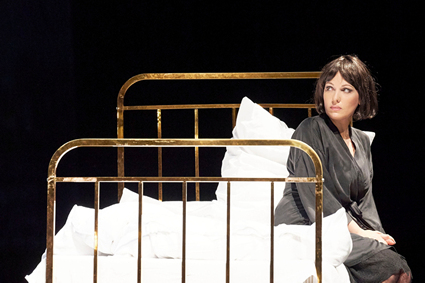| Opera Reviews | 7 May 2024 |
An interesting and important revivalby Moore Parker |
|
| Massenet: Manon
Vienna State Opera 9 June 2019 |
|

Nino Machaidze (Manon)
|
|
|
A decade is a long time in the life of a soprano voice - and, indeed this Andrei Serban production (originally cast with Anna Netrebko and Roberto Alagna) stretches beyond that figure - dating from the year 2007, and witnessing not only a number of alternate interpreters, but a dramatic transition in the original lovers as well as in the current romantic leads, Nino Machaidze and Juan Diego Flórez, who are both appearing in their first Vienna Manon. Incidentally, both undertook a concert version of the work under the same conductor, Frédéric Chaslin, at Théâtre des Champs Elysées earlier this year. “Candor” might be the best overall term to sum up the essence of this showing - and thus a successful and rewarding event - even if the cast was (in part) less than ideal. At age 25, Machaidze hit the headlines when replacing a pregnant Netrebko in the new Salzburg Roméo et Juliette in 2008 and deservedly made a serious splash with her fresh-voiced, confident reading. The Georgian soprano’s artistic instinct, sincerity, and technical finesse have fortunately not only prevailed but ripened. Flórez - further spreading his wings away from the classic bel canto repertoire - is wisely encroaching upon the French Romantics, which undoubtedly lean closest to his natural vocal assets (an essentially lightweight instrument, dominated by upper harmonics which aptly blend hand-in-glove with the language). Technical acumen and an unfailing musical instinct won the day here (in his first ever stage reading of Des Grieux) with the Peruvian tenor cleverly pacing throughout (and skillfully riding Act 3’s Saint-Sulpice dramatic challenge), while creating a heartfelt and appealing figure - all to score a deserved hit. Adrian Eröd is no stranger to this production - and while opening with suave aplomb, sporting his slender baritone and pointed enunciation in establishing this rather despicable character, seemed to run somewhat out of steam (both in verve and vocal substance) as the evening progressed; reminding that Lescaut (both in this and the Puccini version) is a challenge not to be underestimated. A strong ensemble included Clemens Unterreiner’s wonderfully-swaggering - yet uptight - Brétigny, Michael Laurenz’ eccentric and powerfully colourful Guillot de Morfontaine, and an outstandingly stalwart Count by Dan Paul Dumitrescu. The three wonderfully contrasting (yet musically harmonious) tarts, Poussette, Javotte, and Rosette were taken by Ileana Tonca, Svetlina Stoyanova, and Zoryana Kushpler respectively. Returning to the pit, Frédéric Chaslin whipped the evening into an early frenzy - with proceedings somehow remaining a touch hectored and nebulous, rather than enjoying the potential transparency and effervescence that the Vienna Opera Orchestra can yield. Masterly co-ordination - and accommodation - for the entire cast was, however, “mot du jour” throughout - in what was, unquestionably, an interesting and important revival.
|
|
| Text ©
Moore Parker Photo © Wiener Staatsoper / Michael Pöhn |
|







